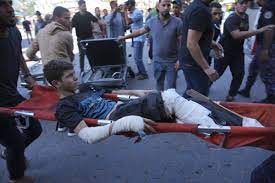DEIR AL-BALAH, Gaza Strip (AP): The doctors gave Shaimaa Nabahin an impossible choice: lose your left leg or risk death.
The 22-year-old had been hospitalized in Gaza for around a week, after her ankle was partially severed in an Israeli airstrike, when doctors told her she was suffering from blood poisoning. Nabahin chose to maximize her chances of survival, and agreed to have her leg amputated 15 centimeters (6 inches) below the knee.
The decision upended life for the ambitious university student, as it has for untold others among the more than 54,500 war-wounded who faced similar gut-wrenching choices.
“My whole life has changed,” said Nabahin, speaking from her bed at the Al-Aqsa Martyrs Hospital in the central town of Deir al-Balah. “If I want to take a step or go anywhere, I need help.”
The World Health Organization and the Health Ministry in Hamas-run Gaza say amputations have become commonplace during the Israel-Hamas war, now in its 12th week, but could not offer precise figures. At the hospital in Deir al-Balah, dozens of recent amputees are in various stages of treatment and recovery.
Experts believe that in some cases, limbs could have been saved with proper treatment. But after weeks of Israel’s blistering air and ground offensive, only nine out of Gaza’s 36 hospitals are still operational. They are greatly overcrowded, offer limited treatment and lack basic equipment to perform surgeries. Many wounded are unable to reach the remaining hospitals, pinned down by Israeli bombardment and ground combat.
Sean Casey, a WHO official who recently visited several hospitals in Gaza, said the acute lack of vascular surgeons — the first responders to trauma injuries and best positioned to save limbs — is increasing the likelihood of amputations.
But also in many cases, he said, the severe nature of the injuries means some limbs are not salvageable, and need to be removed as soon as possible.
“People may die of the infections that they have because their limbs are infected,” Casey told a news conference last week. “We saw patients who were septic.”
Israel declared war after Hamas militants stormed across the border on Oct. 7, killing some 1,200 people, mostly civilians, and taking more than 240 hostages. Israel has vowed to keep up the fight until Hamas is destroyed and removed from power in Gaza and all the hostages are freed. More than 20,600 Palestinians have been killed in the fighting, about 70% of them women and children, according to Gaza’s Health Ministry, which does not differentiate between civilians and combatants among the dead.
Before the war, Gaza’s health system was overwhelmed after years of conflict and a border blockade enforced by Israel and Egypt in response to the 2007 Hamas takeover of the territory. In 2018 and 2019, thousands were wounded by Israeli army fire in weekly Hamas-led anti-blockade protests, and more than 120 of the wounded had limbs amputated.







